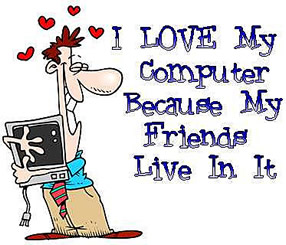Here are my notes from David Weinberger’s presentation at community 2.0. In other words, these are my interpretations of his words (not my words), and he talks pretty fast, so I might have some typos or other errors.
Community is a set of people who care about each other more than they have to. It starts with conversation, and out of that a community can (but may not) emerge. Conversation is not just people talking; conversations are:
- voluntary
- open ended (you don’t know what you will get out of it)
- in your own voice
Marketing violates all of these definitions of conversations. Marketing is broadcasting one to many, but the broadcast era is ending (not going away, but decreasing in importance). We no longer spend as much time as we used to sitting and passively watching TV – we now split this time on the internet where we can also interact with and contribute to the content. We can add our own videos reactiving to other videos on YouTube. We are doing the broadcasters job, but we are doing it for each other and sending them around to share with our friends. Additionally, we contribute our own perspectives through the comments. We invent new ways of talking to each other.
DNA is not information. DNA is represented through diagrams with labels to show DNA as information, which doesn’t really look anything like real DNA. DNA isn’t information – it’s made out of other stuff in our bodies. Information is a representation, not the actual reality. DNA and brain patterns can be modeled in the computer, but the model is not the same as consciousness (Kurzweil) A model is just a symbol, not an actual brain or piece of DNA.
We want to provide people with information. We don’t necessarily read the newspaper for information – entertainment, etc. At conferences, we go through a lot of information, but people are really here for the cocktails and discussions that happen at the cocktail reception.
The view of a person on the computer is more like a database: name, id number, etc. People in the 50’s were afraid that we were reducing people to numbers within a database. Library of congress catalogs a ton of information. Shel Israel tweets thousands of times a day. Flickr a million photos a day; Facebook 8 million photos a day. *Control doesn’t scale* It doesn’t want to scale, and the internet only succeeded because there was no centralized control. We don’t have to worry about managing every piece of content.
We have abundance: of the good & the bad. We don’t give up on email because of the spam. We manage the abundance of bad (filters, etc.) It’s harder to manage the good stuff and find the right things to read. So much good content, but not enough time in the day to read it. Now we digitize everything and need to come up with new principles of organization. It used to be a goal to get everything in one spot organized in one way (card catalogs, etc.) This doesn’t work online. We look fr things in a variety of ways and brows using different information. Amazon does a pretty good job of organizing information for the online world using a lot of logic to determine which books are statistically more likely to be the right result for you based on titles, text, tags, reviews, lists, search within book, etc. They also give us unique ways to browse the information. Any site that lets you tag puts the users in control of the organization of the site. We (the users) decide the order and organization.
Library of congress put a bunch of photos that they were having issues categorizing along with the information that they had. They allowed users to add to tags to help categorize. Every tag becomes a bookshelf. Additionally, we can put boxes around portions to add notes and comments, and we will fill up all of the available space with information given the freedom to do so. People will also get creative when they run into limitations. For example, when they maxed out the 75 tag limit, people started added tags into the comments.
Knowledge is becoming conversation. Newspapers have a limitation of the physical which provides authority (only one front page with editors who find the “best” stuff for the front page). On Digg, the front page is outsourced to the users. Our inbox is also a front page where we share information and recommendations with our friends and contacts.
Twitter is also becoming a front page. It’s not about people posting what they had for breakfast – you can unsubscribe from them. Others are doing really interesting things. There is intimacy in details, and we get all kinds of interesting information from other people on Twitter.
Communities are smarter than any of the individual participants.
Communities, like Facebook, provide all of the context that a static database of the 50s lacks. We overflow the boundaries. We make connections which lead to conversations which lead to community. Without control we overflow boundaries and create abundance of information. We do it together at our best when we are in communities.

